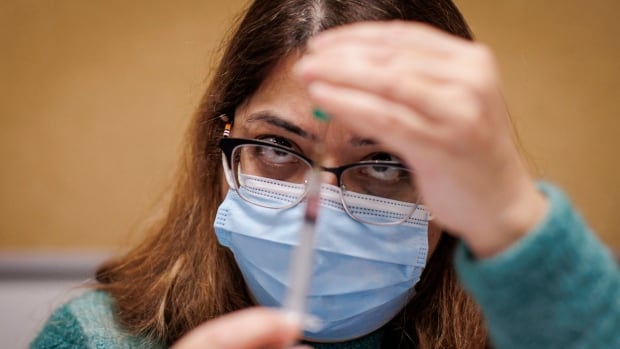Toronto Public Health has reported 13 cases of invasive meningococcal disease (IMD) so far this year, more than the total number of annual cases since 2002, resulting in two deaths.
In a news release Friday, the city described IMD, more commonly known as meningitis, as a rapidly becoming severe and in some cases life-threatening bacterial infection.
Public health officials say other countries, including the United States, are also reporting rising cases, including domestically in Manitoba and Kingston, Ontario.
Anyone can get the disease, but Toronto Public Health says it's most prevalent among children under five and teenagers and young adults who haven't been vaccinated against IMD.
Health officials say children typically get the vaccine at 12 months of age and in grade seven, but are eligible to get the vaccine for free at other times through Toronto Public Health immunization clinics.
People between the ages of 18 and 36 who didn't get the meningococcal vaccine as children can also get the vaccine for free through public health, the agency said.
What is IMD?
Invasive meningococcal disease is caused by the meningococcus bacteria, and the infection is typically spread through saliva or spit and “close or prolonged contact,” according to Toronto Public Health.
WATCH | CBC News' Dale Manukdok reports on meningitis: 
Meningitis cases on the rise in Toronto
So far this year, Toronto Public Health has reported 13 cases of invasive meningococcal disease, known as meningitis, which has resulted in two deaths, and as CBC's Dale Manuk-Doc explains, doctors are urging people to make sure they get vaccinated.
Health officials said the infection could spread to the “lining of the brain and spinal cord (meningitis) or the bloodstream” but could be treated with antibiotics.
Toronto Public Health is particularly advising people to get vaccinated if they plan to travel or attend large gatherings, from the annual Hajj pilgrimage to Mecca in Saudi Arabia to Pride events both domestically and abroad.
“Cases are occurring in people who have both traveled outside of Canada and those who have not,” the news release said.
Dr. Isaac Bogoch, an infectious disease specialist at Toronto General Hospital, told CBC Toronto the rise in cases is concerning, but it's important to put the increase in perspective.
“We live in a city of millions of people and we have 13 cases,” Bogoch said.
“There are still many cases we've seen in the past and it's important to recognise that. It's also important that people recognise there are measures they can take to reduce their risk of contracting this rare but very devastating infection.”
VIDEO | Ontario tells students to update on vaccinations 
Ontario warns: Failure to update child's vaccination records will result in school suspension
Tens of thousands of Ontario students face suspension if they don't update their vaccination records as the provincial government pushes for children to be vaccinated against everything from COVID-19 to chickenpox.
Symptoms to look out for
Toronto Public Health lists the following as early symptoms of IMD:
Fever. Aches. Joint pains. Headache. Stiff neck. Increased sensitivity to light.
Anyone experiencing these symptoms is urged to seek medical attention immediately. For more information, visit the City of Toronto website.



